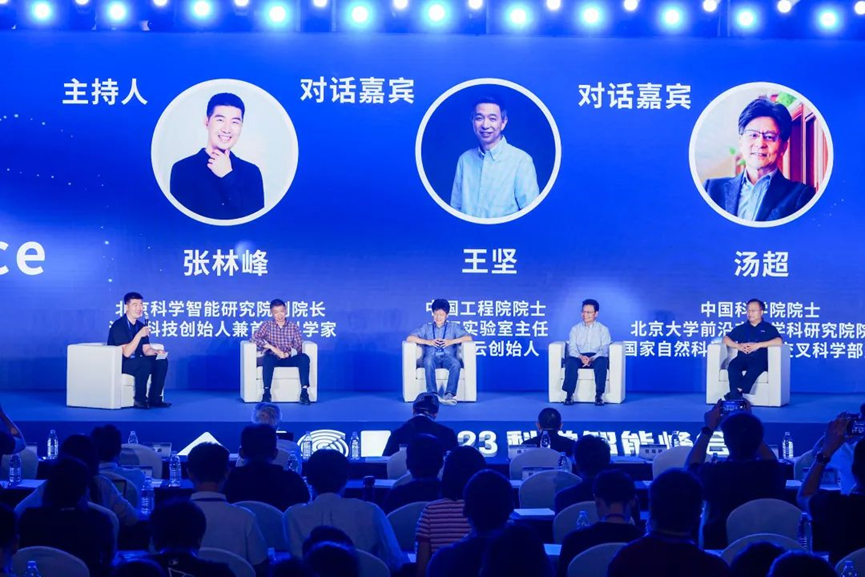

The 2023 AI for Science Congress was held in Beijing on August 10-11. More than 10 academic forums and panel discussions about topics such as "co-building AI4S infrastructure" and "empowering R&D and application" were organized. Focusing on the joint development and typical application of AI for Science (AI4S) infrastructure, academicians, experts, government officials and business representatives discussed key areas of development under the current situation and presented their findings and technologies.
At the roundtable session of the main forum, TANG Chao, Academician of the Chinese Academy of Sciences, Executive Dean of the Academy for Advanced Interdisciplinary Studies at Peking University and Director of the Department of Interdisciplinary Sciences at the National Natural Science Foundation of China; E Weinan, Academician of the Chinese Academy of Sciences, President of the AI for Science Institute in Beijing and Director of the Center for Machine Learning Research at Peking University; WANG Jian, Academician of the Chinese Academy of Engineering and President of Zhejiang Lab; HUANG Tiejun, President of Beijing Academy of Artificial Intelligence and Director of the State Key Laboratory for Multimedia Information Processing at Peking University, held a dialogue on the theme "Foundation Model and AI for Science" to discuss the further breakthroughs in AI and the growing popularity of AI for Science, and explore ways to integrate data-driven and principle-driven research methods. ZHANG Linfeng, Vice President of the AI for Science Institute in Beijing and Founder & Chief Scientist of DP Technology, served as a moderator in this roundtable dialogue.

"I think AI for Science is the best opportunity in the history of scientific and technological innovation in China." In the view of Academician E Weinan, there's plenty of room for AI for Science to grow, which can bring about changes in all aspects from scientific research to industrial implementation. Moreover, it's more likely to build next-generation industries based on AI for Science.
What computing infrastructure is needed as AI for Science becomes popular rather than merely a vision? About this question, Academician WANG Jian held the view that accessibility and affordability are essential to infrastructure, and this is also the case with AI infrastructure. A good AI infrastructure is accessible to both ordinary students and professors with big projects. That means "you can use as many GPUs for computation as you want."
Regarding the further development of AI for Science, Academician WANG Jian said that in the past, research was hypothesis-driven, but now it is data-driven. The most important thing about data is to facilitate problem framing, so as to generate real innovation. In the era of AI for Science, it is very challenging to formulate new hypotheses based on data.
In the view of Prof. HUANG Tiejun, it is necessary to build several big platforms and solve several big problems in support of the development of AI foundation model or AI for Science, and the key point here is multi-party cooperation and collaboration. "It has often been said that team spirit is essential to bring together the resources necessary to accomplish great tasks and solve big problems."
"In the long run, access to talent will be the biggest difficulty to scaling up. Without long-term investment in education and scientific research, a good atmosphere cannot be created, and this results in unsustainable momentum." Academician TANG Chao called on young scientific and technological workers to throw themselves into AI, constantly put forth new ideas, and pioneer the next era.
It is reported that the 2023 AI for Science Congress was guided by Zhongguancun Forum Office, hosted by the AI for Science Institute in Beijing, and jointly organized by Beijing International Center for Mathematical Research at Peking University, Center for Machine Learning Research at Peking University, Beijing Advanced Innovation Center for Materials Genome Engineering, DeepModeling, AI4EC Lab, Eastern Institute for Advanced Study (Tentative), College of Pharmaceutical Sciences of Shanghai Jiaotong University, DP Technology, Suzhou Lab, Zhejiang Lab, Computer Network Information Center of the Chinese Academy of Sciences, and Ningbo Institute of Materials Technology & Engineering of the Chinese Academy of Sciences (in pinyin alphabetical order).











